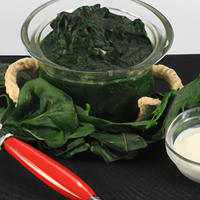
1 serving (100 grams) contains 23 calories, 2.9 grams of protein, 0.4 grams of fat, and 3.6 grams of carbohydrates.

Log this food in SnapCalorie

Nutrition Information
Calories |
57.5 | ||
|---|---|---|---|
% Daily Value* |
|||
| Total Fat | 1 g | 1% | |
| Saturated Fat | 0.2 g | 1% | |
| Polyunsaturated Fat | 0 g | ||
| Cholesterol | 0 mg | 0% | |
| Sodium | 197.5 mg | 8% | |
| Total Carbohydrates | 9 g | 3% | |
| Dietary Fiber | 5.5 g | 19% | |
| Sugars | 1 g | ||
| protein | 7.2 g | 14% | |
| Vitamin D | 0 mcg | 0% | |
| Calcium | 247.5 mg | 19% | |
| Iron | 6.8 mg | 37% | |
| Potassium | 1395 mg | 29% | |
* Percent Daily Values are based on a 2,000 calorie diet. Your daily values may be higher or lower depending on your calorie needs.
Food Attributes
Source of Calories
About Blattspinat
Blattspinat, or leaf spinach, is a nutrient-dense leafy green commonly used in European and global cuisines, appreciated for its mild flavor and versatility. Native to Persia, spinach has become a staple in dishes like salads, soups, and stir-fries. Known for its impressive nutritional profile, Blattspinat is rich in vitamins A, C, and K, along with essential minerals such as iron, calcium, and magnesium. Additionally, it's an excellent source of dietary fiber and antioxidants, which support digestion and combat oxidative stress. Low in calories and fat, spinach makes a heart-healthy addition to meals. It contains oxalates, which may affect calcium absorption in some individuals, but these can be minimized by cooking. Whether steamed, sautéed, or raw, Blattspinat is a powerhouse of nutrition, ideal for promoting bone health, boosting immunity, and maintaining overall wellness.



